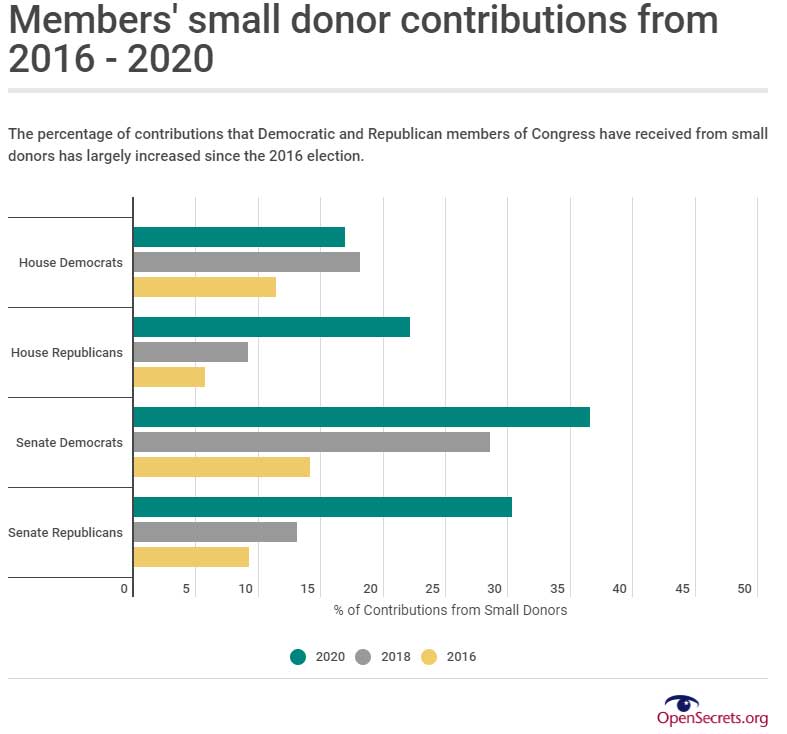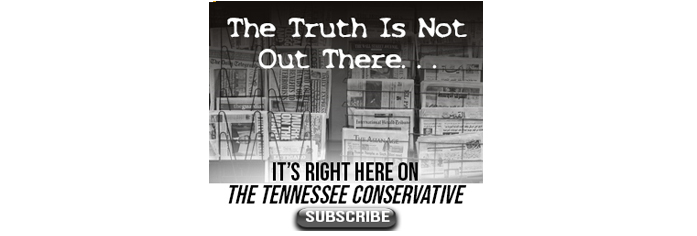Photo Credit: AP
Published February 16, 2021
The Center for Responsive Politics [By Krystal Hur] –
Small donors played a pivotal role in financing both Democratic and Republican campaigns in the 2020 election. And with Donald Trump currently taking a break from politics and President Joe Biden settling in at the White House, it remains unclear whether small donations will continue to pour in for either party.

On Jan. 20, Biden took office and Vice President Kamala Harris swore in Georgia Sens. Jon Ossoff (D-Ga.) and Raphael Warnock (D-Ga.), establishing the Democratic Party’s control of the White House and Senate on the same day. And as the GOP’s reign in Washington comes to an end, so have its relationships with some corporate power players who have historically been influential supporters of the Republican Party.
In recent years, small donors have helped fill the void corporations left in Republican campaigns’ pocketbooks. About $378.1 million — nearly half — of Trump’s 2020 donations came from small individual contributions. Trump’s allies in Congress such as Reps. Matt Gaetz (R-Fla.) and Elise Stefanik (R-N.Y.) received a significant portion of their campaign donations from small donors in 2020, raking in $3.8 million and $6.2 million, respectively.
While Trump floated the idea of creating a third party according to the Wall Street Journal, a Trump spokesperson has since said that he is not currently considering it. Trump has also raised $105 million between four political committees and seeks to maintain his position in the GOP.
Paul Herrnson, professor at the University of Connecticut and fellow at the Center for Responsive Politics, said the influx of GOP small donors in the 2020 election — brought on by the high-interest, high-stakes nature of the election and ease with which political campaigns could reach donors online — will likely continue. But the number of donors who continue to contribute depends on a number of factors, he said.
“If [Trump] runs, a lot of those people will be motivated to give again,” Herrnson said. “If he doesn’t run, there’ll be some that’ll be motivated to give to like-minded candidates, particularly if he endorses them and becomes part of their … brand that’s associated with their solicitations.”
Corroborating Herrnson’s statement, Sen. Josh Hawley (R-Mo.) had his best fundraising period while backing Trump’s election challenge, raising $969,000 in January according to Axios. House Minority Leader Kevin McCarthy (R-Calif.) recently targeted Trump’s supporters in his own fundraising efforts in an example of the powerful pull Trump’s donors have.
As for Democrats, who had record-breaking fundraising numbers in the 2020 election cycle, Herrnson said the “dynamics are pretty much the same” as they were with Trump as president.
“Trump’s presence mobilized people to give in 2020, [and] will mobilize people to give in ensuing years,” Herrnson said. He added that Democrats will likely try to highlight the darkest spots in Trump’s legacy, including the Capitol riot, to garner contributions from small donors.
“The more sort of inflammatory and threatening the solicitation, the more likely someone’s going to respond to it, particularly a small donor who gets an impersonal solicitation through the mail or over email or through social media,” Herrnson said.
Trump is no longer president, but he’s still a mainstay in Democratic fundraising emails. Meanwhile, the Democratic Congressional Campaign Committee has already kicked off an ad campaign attacking swing district Republicans by linking them to Rep. Marjorie Greene (R-Ga.) and the QAnon conspiracy theory.
Eleanor Powell, professor at the University of Wisconsin-Madison, said it’s unclear whether corporations will prolong their political donation boycotts, though she doesn’t expect contribution halts to be permanent. But continued individual contributions would help minimize the harm that a drought of corporate PAC contributions could cause to Trump’s allies, she said.
“[Continued individual donations] will certainly mitigate some of the harm … as many of his allies don’t rely that heavily on corporate PAC contributions,” Powell said. “But it could be a non-trivial blow to at least some members who have come to rely on that money.”
House Republicans received 22.1 percent of their contributions from small donors in 2020, marking a jump from 5.7 percent in 2016. Senate Republicans also received a boost in the recent election cycle, receiving 30.3 percent of their donations from small donors compared to 9.2 percent in 2016.
House Democrats’ small individual contributions rose from 11.4 percent in 2016 to 16.9 percent in 2020 while Senate Democrats experienced an increase from 14.1 percent in 2016 to 36.5 percent in the recent election. For Democrats, the biggest jump was from 2016 to 2018 while Republicans saw a bigger jump from 2018 to 2020.

Powell added that organizations with “a more targeted stoppage” could make Republicans in Congress have to rely on small donations more than before.
”The Republican House members in particular depend on a lot of PAC contributions and if … that well dries up, they’re gonna have to either look for donors elsewhere, look harder for the small-dollar donors,” Powell said. “But those efforts take time and relationship building, and if they can’t find replacements they’re going to really be hamstrung.”
The Koch Network, a warrenlike web of political groups typically funded by undisclosed donors, is one of several key players known for supporting Republican causes. But that group recently veered from making partisan political donations.
Emily Seidel, CEO of the network’s primary advocacy group Americans for Prosperity, vowed in a letter in 2019 that the organization would “support the primary election of lawmakers, regardless of political party, who stick their necks out to lead diverse policy coalitions.” After the Jan. 6 riot in the Capitol, she condemned the event and told Politico that the Koch Network “will continue to look for ways to support those policymakers who reject the politics of division and work together to move our country forward.”
The National Rifle Association spent most of its total $29.1 million expenditure in the 2020 election cycle to support Trump, but recently filed for bankruptcy on Jan. 15 following a years-long decline in spending. The death of casino mogul Sheldon Adelson this year, who with his wife Miriam donated almost $525 million to Republican causes, signifies the loss of yet another major donor instrumental in fueling GOP campaigns.
Powell also said that wealthy donors who want to distance themselves from Trump or the Capitol riot could turn to “dark money” funding. Dark money is used for independent expenditures and does not go directly to candidates.
Democratic super PACs received more than twice the amount of contributions from undisclosed donors that Republicans did in the 2020 election, with Biden receiving about $132 million compared to Trump’s approximately $22 million, according to a Center for Responsive Politics analysis for CNN.
Democrats also largely benefitted from anonymous donations in the 2018 election, though dark money overwhelmingly boosted GOP candidates before then. Dark money’s role in future elections could be complicated if the For the People Act, a campaign finance reform bill, is passed.
“Our system right now is so broken in terms of disclosure loopholes,” Powell said. “It certainly seems like anyone who would be inclined to continue their giving pattern but is concerned about the sort of political toxicity of it from a PR perspective would… be consulting a campaign finance lawyer and figure out exactly how to do this in a more subtle way.”
In regard to the 2022 election more broadly, Powell said that while electing a new president has historically almost always resulted in his party losing seats in the following midterm election, living in “a world of particular political uncertainty” leaves the future unclear.
“We don’t know what’s going to happen with the pandemic, the economy, there’s just a lot of uncertainty in the world and people’s lives right now and that uncertainty certainly carries over into politics as well,” Powell said.





